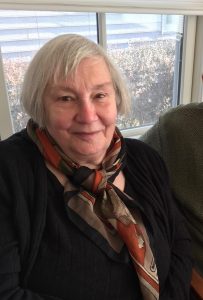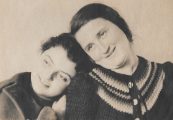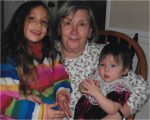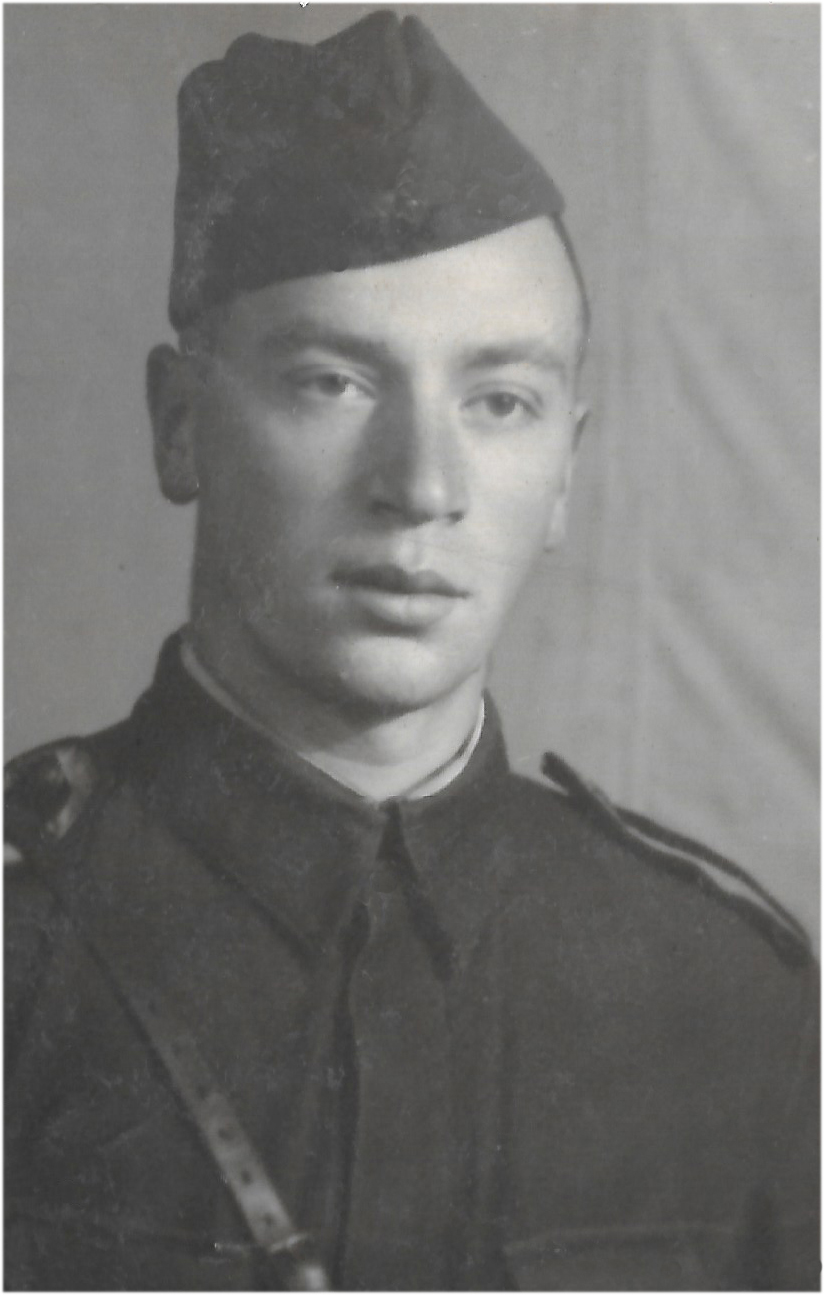Date: November 30, 2016
Location: VOLKOVA RESIDENCE
Interviewer: NANCY GORRELL
Q: What would you like to share about your father’s background?
My father, David Kogan was born on September 26, 1921 in Odessa. When he was four or five his family moved to Moscow. His father was a specialist in agriculture. He got a job in the Ministry of Agriculture. They were educated Jews. Before the Revolution, the chances for education for Jews were limited. My grandfather got his education mostly after the revolution although he started before. My father went to school in Moscow and graduated high school in 1939 and then went to the university for engineering until September 18,1939. When World War II started, when Hitler invaded Poland all the boys by Stalin’s order were taken into the army. My father had studied just 18 days.
Q: What was your mother’s name?
Her name was Raisa Volkova, and she was born in Kiev on March 11, 1920. My mom was in the same graduation class as my father. They knew each other since middle school.
Q: Did your father or family experience any anti-Semitism growing up and going to school in Moscow?
Of course, there was anti-Semitism before the war and before the Revolution. There were pogroms. Both my mom’s and dad’s families suffered from that. Jews could not live in big cities most of them lived just in small villages. My grandfather’s brother left for America in 1905. My grandma’s brother left for Palestine to study because he could not enter any University in Russia. But officially all the limits for Jews disappeared after the revolution in 1917. They could study, they could live everywhere. So in 20s and 30s it was more like just jokes about Jews. There were no rules against admitting Jews to the universities or jobs. Anti-Semitism started again, after the war and especially in 1950s and later.
Q: When were you born?
On May 15, 1945. My father got many medals during the war from the Soviet army. After the war, he wanted to leave the army but was not allowed to. He had to serve in the army until 1955. After that, he returned to Moscow, got a job and lived with his family.
Q: What was it like growing up in post-war Moscow? Was there any persecution of Jews?
I was born six days after the war was over. My cousin was born at the same time. It was not easy to have two infants. It was a very hard life. All food was rationed. It was impossible to find cloth for blankets for baby clothes. There was no running water even in Moscow. They bathed us in old suitcases. Well, I do not have many memories about the first years after the war; just know about all these problems from my grandparents and parents. Our childhood, my cousin’s and mine, was very happy even though we did not have many toys or any luxury. But I do remember the fear in 1952, when Moscow’s Jewish doctors were arrested and there were rumors that all Moscow Jews would be deported to the Far East. The trains were ready. Only Stalin’s death saved us all. I do remember Stalin’s funeral when thousands people were killed. Luckily, nobody of my family was there.
Q: Who survived in your immediate family?
Fortunately, my parents and grandparents all survived as well as my mother and father’s brothers. But Jakov Krichevsky, my mother’s cousin, died during the Leningrad blockade. He was a student of Leningrad University and stayed there so he was starving. All the food he got he shared with his fiancée and saved her life. After the war, she found his mother and told her how he died.
Q: Did you experience any anti-Semitism after Stalin growing up in Moscow?
No, nothing serious in Moscow, but when I wanted to go to the university, I took exams and passed and did very well. But when I looked at the results, my name was not on the list. My grandfather and I went to check why. We thought there was a mistake and they told us “We already took our limit of Jews.” This was 1962.
Q: What did you do?
Instead, I entered the Pedagogical University for teaching and I became an elementary and English and biology teacher. I worked and taught in Moscow for 40 years at English speaking school #1816.
Q: How did you meet your husband?
I met my husband in 1968. We had one child, Natalia, and then we divorced in 1973. Twenty-four years later, the anti-Semitism was still the same. It was 1986, but this time it was my daughter’s experience. Her teacher told her she should enter Moscow University and I told the teacher “we are Jews” and the teacher said, “I will try to find out if this is an issue,” and some days later the teacher called me to say, “You were right, she will not go there, there is no chance she will be admitted.” But most Jews got their education anyway, despite the anti Semitism. All people in my in family, we got our education. My daughter went to a different university. I had a colleague that said to me: “Why do you talk about anti Semitism? I got my education; you got your education. I have an apartment, you have the same one, I have a job and you have the same one. So where is Anti Semitism?” But then I asked, “Is it ok if your son marries my daughter?” She said, “Over my dead body.” This is anti-Semitism.”
Q: Why and when did you decide to emigrate?
First, I came to the USA in 1993. It was really very interesting. An American teacher in River Falls, Wisconsin wanted to do a correspondence with a Russian teacher. He had many questions about our school, about our teaching, so we started to write each other via e-mail. Then we started some telecommunication projects. He was an elementary teacher and each of his students started a story, and my students finished the story. He got a Christa McAuliffe Fellowship and could come to Moscow for three months to work at my school. And after that I got an invitation to come to their school to work there. Since then, we stayed friends. He named his daughter after me. That’s how I got to America first.
Q: Describe your American summer school experience.
I went there to organize a summer school for American kids, and American teachers came to Moscow for a summer school with my students. The exchange continued for several years. And then my daughter got a fellowship for graduate school in NYC at the New School for two years, and there she met her future husband. After getting Masters Degree she had to return to Moscow, on the condition of fellowship. She returned to Moscow for two years, and then she returned to the US to be with her husband. Her daughter was born in Moscow. Since 2005, she lives here. And then we decided I should move to US because Natalia was my only child, and I wanted to be with her. I moved to New Jersey in 2007. Natalia works for Jewish Federation in East Brunswick, NJ. And I have two granddaughters, Dina and Jolie. Mostly, I have been full time grandmother.
Q: Did you have difficulty coming to America?
We applied in 2006 and I got permission a year later. My daughter and her husband had to vouch for me, and we had to get an affidavit. Before 1990s Russia didn’t want to let the Jews go. They had to pay back to the government whatever their education cost, whatever their apartments costs, (all apartments belonged to the government) when they left, and they had to pay for restoration of their apartments. They could only take one suitcase each. No money or valuables could be taken out of the country. When I left, by that time, 2007, it wasn’t a problem. I could take whatever I wanted except army medals of my fathers.
Q: Tell me more about the Soviet army medals.
My dad had a lot of medals and the Order of the Red Star. By Russian law, these medals and cannot be taken out of the country, as they are our cultural treasure. But how could I leave them there? They are part of our family history, and I wanted my grandchildren to know it and to be proud of them. But it took me almost a year to get them out. All the bureaucracies to get the permission from the minister of culture himself. And even with his permission, no one knew whether customs would allow it. So my friends came with me, just in case, to take the medals if they did not allow me to take them with me. So now my granddaughters know the stories, and they will have the medals. My granddaughters know a lot of our family history, about their ancestors, about our country.
Editor’s Note: see family photos and more of Elena’s father’s medals in David Kogan’s Survivor Registry
Lorem ipsum dolor sit amet, consectetur adipiscing elit. Fusce condimentum lacus purus, et suscipit justo semper nec. Maecenas non lectus odio. Aliquam volutpat neque ac placerat gravida. Nullam sit amet venenatis ante. Proin vestibulum volutpat purus vel dapibus.






